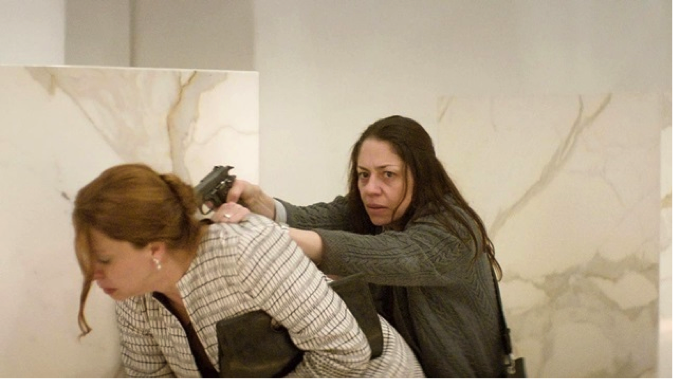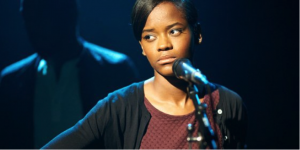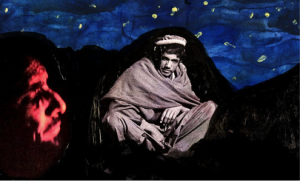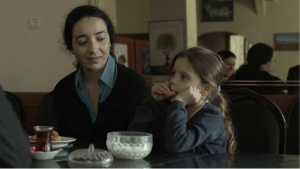
A Monster with a Thousand Faces
By Rob Lewis.
Tickets? Check. Popcorn? Check. Bottle of water? Check. Notebook? Check. Festival Guide? Check. It’s 107 minutes long. That means if I leave before the credits and take a taxi, I can reach the Feriye in time for the 7 p.m. showing. Isn’t that my old teacher/classmate/someone I once chatted to at a Meeting on the Bridge/lover… But there is no time, the lights are dimming. The director is present. Any questions? There’s nothing I want to ask. Hang on, I’ve got a good question. Have I got the courage? Yes, of course I have. Why won’t the microphone come my way? Please notice my raised hand. “That was the last question…” Damn. Let’s get out and have some fresh air, a glass of çay. Then we’ll be wide awake for the third film of the day. Can I see a fourth? Will I fall asleep?
It’s festival time again. The 35th Istanbul Film Festival was held from April 7th to the 17th, 2016. Although there were worries about recent terrorist attacks in Istaklal Street, the event went ahead as planned. It was held over fewer days than previous festivals, which typically covered 3 weekends, but on this occasion there were more chances for people living far from the centre in places such as Sultangazi and Maltepe to attend films.
One Woman’s Struggle
This year’s winner of the International Golden Tulip Award, presented in memory of co-founder Şakir Eczacıbaşı, was the Mexican thriller A Monster With A Thousand Heads by Uruguayan-Mexican director Rodrigo Plá. This story of one woman’s fight against the system was first seen at the Venice Film Festival. With moments of comedy to relieve the grittiness, it was especially notable for the performance of Jana Raluy in the main role.
Other movies that made waves in this section included young Argentine director Pablo Aguero’s Eva Doesn’t Sleep, starring Gael Garcia Bernal, about Eva Peron; Belgica, from Felix Van Groeningen, sexy, violent, musical, youthful, and vigorous; the Greek Interruption, an ambitious production directed by Yorgos Zois, in which the audience are taken hostage and incorporated into the play; and Family Film, from the Czech Republic (or should we say “Czechia” after the recent vote to change the name?). In Olmo Omerzu’s offering, boy meets girl, boy loses virginity, boy loses girl, parents lose yacht and dog, boy loses kidney– all this in a modern dysfunctional family setting. The dog nearly steals the show.
The International Golden Tulip Competition Special Jury Prize went to director Brady Corbet’s The Childhood of a Leader. This won the best debut prize at Venice for Brady Corbet, the American actor-director familiar to viewers of television’s 24, and studies whether we can spot the early stirrings of fascism in a child.
Lack of Black Nominees
“If you’re gonna tell a story, tell it with attitude.” In a year notable for the absence of black nominees in the categories of both main and secondary actors of either sex, plus best director and best film at the Academy Awards, it was noticeable that there were some powerful examples of all these on display in Istanbul, which may well have merited those prizes. Actor Don Cheadle’s biopic of jazz trumpeter Miles Davis Miles Ahead (although Davis himself rejects the term jazz, calling it bizarrely “social music”) went down well with the punters. Cheadle cast himself in the lead role, telling the story of the “lost years” in Davis’s career, when he sank into drink, drugs, dames and gun violence, through an interview with Ewan McGregor’s reporter, in which the latter gets caught up in the craziness. The music lives with you for days afterwards.

Urban Hymn
Another noteworthy black performance is that of debutant Letitia Henderson in Urban Hymn. This is a hard-hitting drama about young black girls in South London. Jamie is 17 and lives in a care home. The relationship she develops with her carer, and her struggles to escape from the vicious cycle of petty crime, drugs and violence to become a singer is both moving and true to life. There’s even a cameo from 70s and 80s post-punk star, Billy Bragg.
Also from Britain is The Lady in the Van, directed by Nicholas Hytner. Only in London could a smelly, rude, cross old lady set up home in an affluent street, being allowed by the residents to use the amenities. The “lady” is Maggie Smith, often seen before at the festival, and the playwright Alan Bennett, who she befriended in real life, is played by Alex Jennings. Just as moving is BBC/Irish Film Board’s Brooklyn, featuring a performance from Saoirse Ronan which many think merited the Oscar it was nominated for. Eilis is emigrating to the USA in the early 1950s. She will have to decide how to leave behind her empty but secure life, and whether she can adapt to The New World.
The Treatment of Refugees
In contrast to Brooklyn, in which people basically treat each other decently, Mediterranea deals with one of the hottest current topics: refugees and their treatment in the countries that host them. It follows brothers taking the alarmingly dangerous path to Europe, where they try to start a new life picking fruit in Italy. This film was well received at Cannes last year. The protagonist is played by Koudous Seihon, and he told the Istanbul audience about how the actors we see onscreen are the actual refugees themselves and how almost all the events depicted really happened. However, Koudous told us that he is involved in a second film updating the story, so there is hope for a few. Italian director Jonas Carpignano was the winner of the Film Award of the European Council (FACE), while the AUDENTIA Award was presented to Anca Damian, the director of The Magic Mountain, which was also part of the festival’s Human Rights in Cinema section.

The Magic Mountain
There were mixed feelings from the audiences of young director Ben Wheatley’s High Rise. The technical side appealed to some, while others walked out. If you enjoyed Crash and like JG Ballard’s style, there is more of the same here. For some, the first hour was enough. The cast is certainly impressive: Tom Hiddleston, Jeremy Irons, Sienna Miller and the stand-out, Luke Evans. The Opening Film, Midnight Special by Jeff Nichols, who brought us Take Shelter, was a watchable tribute to 1980s fantasy, while Right Now, Wrong Then was an interesting idea from Hong Sang-Soo. It showed two takes on the same story, of a director reflecting on his life in a quiet wintry resort town, as he falls in love. Scorsese, no less, has called him the Woody Allen of South Korea. And then there was One Plus One, in which veteran Claude Lelouch probably relies too much on the charisma of Oscar winner Jean Dujardin and the colourful backdrop of India.
Not many people found Hail Caesar to be the best from the stable of the Coen Brothers films, though it had its moments. A splendid idea, harking back to the golden days of Hollywood, it never quite lives up to expectations and has been enjoyed more by reviewers than audiences.
Powerful Turkish Films

Dust Cloth
The Golden Tulip for Best Turkish Film was presented to Ahu Öztürk who wrote and directed Dust Cloth. The director dedicated the film at the award ceremony to the mothers and women of Turkey, and she said that it would be the women who would restore peace to this country. The film focuses on two women, Nesrin (Asiye Dinçsoy, best actress award) and Hatun (Nazan Kesal), who clean the houses of rich clients. Both wealthy and struggling sets of women have their family issues, and the film also addresses ethnicity in Turkey.
Also highly garlanded was Cold of Kalandar, while Colony, Mr. President, Attention!, Anatolian Tales, Motherland and Swaying Waterlily were much appreciated by critics and the general public alike. Cold of Kalandar is a gruelling film starring Haydar Şişman as Mehmet, a Black Sea farmer and would-be gold prospector. The cinematography is stunning, the mountains, the surfaces, the slippery rocks, deep snow, the sudden green of spring. The story remains a universal but recognisably Turkish struggle. Motherland, also set in a village, is a claustrophobic, realistic, ultimately shocking mother and daughter tale with particularly strong performances from the female leads, played by Esra Bezen Bilgin and Nihal Koldaş. Director Senem Tüzen told the audience she objected to being called a “woman director”, and said she hoped in future there should be no need for such a distinction.
In contrast, Swaying Waterlily is set in the milieu of a well-to-do Istanbul family and documents the life of Handan (Songül Öden), a pitiable women who has everything but has nothing. We truly recognise these people, and director and writer Seren Yüce had, according to the cast, crafted the characters so well that they needed to add little to what was written on the page. Anatolian Tales (by Emin Fırat Övür) examines Anatolian, and in fact world folk tales, with talking heads theorising, while at the same time a fairy story is acted out from a composite of other tales. We are on a quest, like the hero of the tale, representing the journey through adolescence to ultimate adulthood.
For Aficionados
And then there were the cineastes’ favourites: the cycle dedicated to a master, Otto Preminger, and some notable documentaries. Preminger, whether in the cine noir of Where the Sidewalk Ends (1950) or the technicolour of River of No Return (1954), and of course in classics such as Anatomy of a Murder (1959), shows his originality and overall control. And speaking of masters of cinema, Hitchcock/Truffaut brings us the symbiotic relationship of Hitch and the younger Frenchman. How the latter and his colleagues on Cahiers du Cinema were able to reposition the former at the very top of his trade, while also learning so much that they then put into the nouvelle vague. Hitchcock was also the starting point of De Palma. Here, the director of classics such as Carrie (1976) and The Untouchables (1987) speaks to camera most of the time, but what a tale he has to tell! For instance, there is a still photograph of the five friends in the 70s, Brian himself with Coppola, Scorsese, Lucas and Spielberg, drinking together. Finally, there was one recently named in the ten all-time greatest documentaries, Grey Gardens (1975). This fly-on-the wall story of decadence in a once wealthy family on Long Island is long on irony, although the protagonists, Jackie Kennedy’s aunt and cousin, are not particularly lovable.
So the festival came to an end, not without its hitches – visitors complained of cancelled films and some without the advertised subtitles – but still İKSV is to be congratulated once again for putting on a great event, despite the outside pressures.
Rob Lewis writes on film, football and wild mushrooms. He also teaches English at Kadir Has University and had a small part in the Turkish film Kod Adı Koz.
